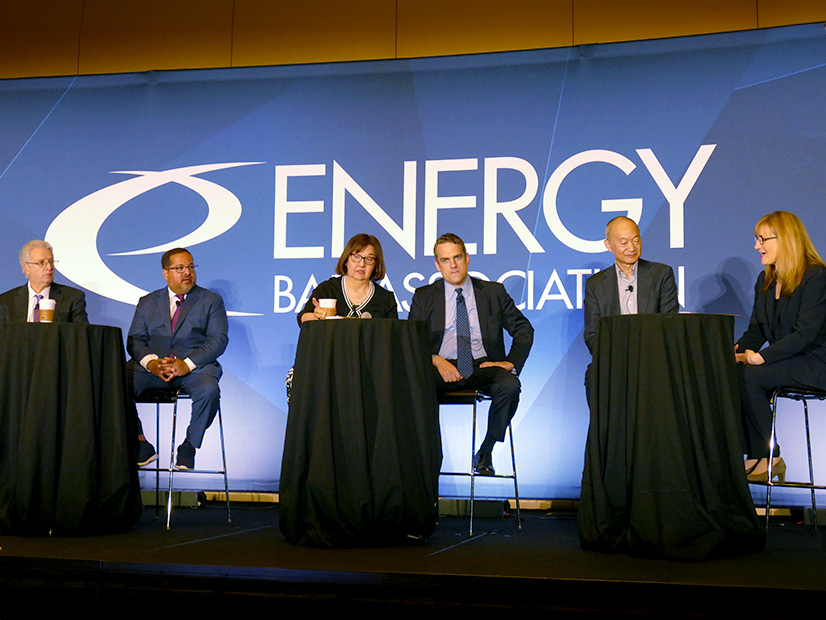
WASHINGTON — The federal Government in the Sunshine Act was passed to bring decision-making into public view, but when it comes to FERC, it does the opposite, a panel of former chairs said at the Energy Bar Association’s Annual Meeting last week.
Some level of agreement is helpful when the commission acts, but it is more difficult to negotiate when the law, enacted in 1976, forbids more than two commissioners from meeting with each other outside of open meetings, said Cheryl LaFleur (2013-2015 and 2017), now chair of the ISO-NE Board of Directors. In any other job, you would gather the decision-makers together in one place and hash out a complex issue, she said.
But “you couldn’t do that; you have to meet one on one with your commissioners,” LaFleur said. “You couldn’t meet as a group. And I always say FERC is not like the Beatles, [who] grow up playing music [together]. It is like the Monkees or the Spice Girls: five individuals chosen separately, and they say, ‘Go make music.’”
FERC used to effectively work on its orders through discussion during the open meetings — and some state regulatory commissions still do that to an extent, like the Texas Public Utility Commission. But now the meetings are almost entirely choreographed, with even the questions commissioners ask staff and the answers written down ahead of time.
Whether it would be a good idea to go back to the old way split the panel.
“I’m all about it,” said James Danly (2020-2021), now a partner at Skadden. “I love deliberating at the horseshoe; it’s my favorite part of the job. … So I can’t speak to that other era; I wasn’t there for it. I think it would be helpful to have more discussion. I certainly was always happy to do so.”
“I think increasingly, as markets are focused on the commission, people are watching very closely, and we’re talking about billions of dollars in investments that the commission is deciding upon at these meetings,” said Neil Chatterjee (2017 and 2018-2020), now a senior adviser at Hogan Lovells. “And if I’m a general counsel; if I’m a CFO of a company; if I’m a lawyer in the Energy Bar, I very much prefer a boring, stable, staged commission meeting. A curveball could potentially roil markets.”
When Chatterjee was on the commission, it voted on a case involving United Airlines and master-limited partnership taxation, which caused companies’ share prices to crash in real time during an open meeting, he added.
Having a debate could work sometimes when it is an issue around reliability, or another issue where politics are not a major factor, LaFleur said.
“What I wouldn’t want to see is just an opportunity for like political grandstanding, where you weren’t really deciding at the table — you just were kind of making speeches — because I think that would be a step in the wrong direction,” she said.
Actually writing complex orders line by line during an open meeting could easily get chaotic these days, said Richard Glick (2021-2023), principal and co-founder of GQ New Energy Strategies. While the overly scripted nature of the open meetings can get tiresome, going off script has its pitfalls as well, with Glick recalling one time he asked staff an impromptu question and the results were not great.
“I feel badly about it,” he said. “But it’s important to have real give-and-take, real questions, as opposed to everything written down in front of you on a piece of paper, and you just go by a script.”
Norman Bay (2015-2017), now a partner at Willkie Farr & Gallagher, also was against the idea of going back to less scripted meetings, noting that it could give the wrong impression of FERC.
“I think members of the bar want to see a commission that is collegial, that is bipartisan and that works well together, right?” Bay said. “Recognizing that there are going to be times when there are sharp policy differences among the commissioners … I fear that if you do everything publicly, it may send the wrong signal in a way that Neil mentioned. So, I think it’s actually better that we have these very vigorous debates in the background.”
All the commissioners agreed earlier in the panel that it is generally better for FERC to act as one, with Danly saying that is especially true for its more “legislative” powers like rulemakings. But politics can sow division on the regulatory body.
When he joined the commission after being an aide to Sen. Mitch McConnell (R-Ky.), Chatterjee admitted he was still acting like a political operator, especially on the Notice of Proposed Rulemaking that the Department of Energy issued early in the Trump administration that would have paid coal plants extra money and torpedoed years of FERC’s work around markets. He wound up voting against that in the end, but some of his communications to the press were a little too political, he said. (See DOE NOPR Rejected, ‘Resilience’ Debate Turns to RTOs, States.)
But now that the rubber is hitting the road when it comes to decarbonization of the grid, the politics are heightened for reasons outside of any commissioner’s background or personality, Chatterjee said.
“I think larger factors have come into play as questions around decarbonization bump up against reliability,” he said. “It just made it harder and harder to compromise on some of these issues.”



